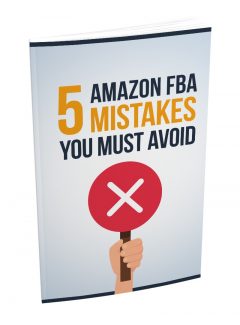 License Type: Master Resell Rights
License Type: Master Resell Rights  File Type: ZIP
File Type: ZIP
 SKU: 63462
SKU: 63462  Shipping: Online Download
Shipping: Online Download
Sample Content Preview
Amazon FBA is a brilliant service for small businesses and entrepreneurs that want to start selling large numbers of products direct to customers. This service makes things so easy, that you can set up your successful business without ever laying eyes on the product!
But that’s also the issue. In many ways, Amazon FBA makes setting up your business too easy. Which means it’s easy to make mistakes, and to come unstuck. Here are 5 big ones to avoid.
1. Not Reading the Requirements
Did you know that Amazon requires for your products to be packaged on arrival? That they need to have a barcode already attached?
Do you know what products can’t be accepted by Amazon, or require them to first assess them for suitability?
No?
In that case, you haven’t done your due diligence as an Amazon FBA reseller! These are crucial requirement and there are no ifs and buts – if your product doesn’t meet Amazon’s requirement, then it will be sent back, and you’ll have wasted a lot of money.
Make sure to comb through this section of the site thoroughly, and then check with the manufacturers that you are working with to ensure that they’re capable of meeting those criteria. Will they be able to place your products in some kind of packaging for instance? (More on this later.)
There are also a few things you will need to do yourself – such as purchasing a barcode. All of this is detailed in full in the full ebook, so make sure that you read carefully and don’t skip any critical steps.
You also need to make sure you are fully aware of all the fees that Amazon charges, its terms with regards to storage, the pros and cons of different types of membership account, and more. This will help you to better calculate the precise profit you can make from selling a particular product at a particular price, and it will help you to make savvier decisions.
2. Forgetting Returns
One of the biggest mistakes that you can make as a reseller business, an Amazon FBA business, or ANY business selling products, is not to realize the potential cost of returns.
You might have spent ages calculating your profits for each unit. Maybe you looked at the cost per unit you’d be paying the manufacturer, the cost of freight forwarding, the cost of carriers…
But you forgot that sometimes people ask for refunds. And when they do that, you will often also need to fund delivery of the refunded item. This can be expensive.
Refunds can be an even bigger issue depending on the niche/industry that you are in. Fashion companies selling clothes will deal with returns more than most for example, seeing as many people will order clothes, find they don’t fit, and then return them. This has actually put many a reseller out of business.
Your job then is not only to take this into account when calculating your potential profits, but also to think about ways around the issue. Which items of clothing get fewer returns? How can you make it as clear as possible what your items look like when worn? And what is your returns policy?
3. Dealing with Unhappy Customers the Wrong Way
One of the biggest mistakes that sellers make, is to act unprofessional when dealing with unhappy customers. As we start to operate on a bigger scale, it’s easy to forget that our customers are people, and to forget to make sure that each of them is having the best experience possible.
And when someone complains? We often ignore it, or just
But that one unhappy customer can do a lot of damage. That’s one unhappy customer who won’t be buying from you again…
…one unhappy customer who can write such a scathing review that people start choosing your competitors’ products over yours… even when they cost more!
…one disgruntled customer who can spread the word and quickly grow to become a thousand people boycotting your service. It's forgetting these little problems, rather than not having an end-game in mind that often leads to the big problems that eventually cripple the business' operations. a business.
So that disgruntled customer, what can you do about that? First of all, make sure you pay attention to your inbox and look for complaints. If your company is big you should consider setting up a 'complaints department' that can deal with these on your behalf and be around twenty-four seven to deal with enquiries and complaints (but don't make the procedure too difficult).
Also ensure you still deal with issues personally and make it your duty to ensure that all dissatisfied customers are duly compensated for any wasted time or money on their part. This might mean sending them something for free or discounting their money - and an apology never goes a miss. This way, once your customer has been dealt with, they won't start spreading the bad word about your company and may even think more highly of you than they did before the incident. Mistakes are only natural in any business - how you deal with them is what will define you in your customers' and clients' eyes.
That's not all you should do though once you've identified an unhappy customer, and if they're unhappy then chances are it's for a reason. Find out what they’re unhappy about - they may well be unhappy that it didn't arrive on time, or arrived damaged. Perhaps it got lost in the post? Either way it's your responsibility, and if you don't deal with the source of the problem it will only lead to more incidences in the future - attack every problem at its route. So, file this issue and look for more occurrences, look through any previous complaints - they are the best kind of market research and completely free (make sure you never delete them).
Don’t see this complaint as a nuisance, but rather as free feedback and market research that you can use to improve your business and avoid issues in future!








